
The Internet's Premier Classical Music Source
Related Links
- Latest Reviews
- More Reviews
-
By Composer
-
Collections
DVD & Blu-ray
Books
Concert Reviews
Articles/Interviews
Software
Audio
Search Amazon
Recommended Links
Site News
 CD Review
CD Review
RCA High Performance
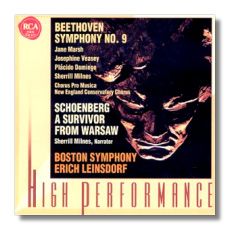
- Arnold Schoenberg: A Survivor From Warsaw
- Ludwig van Beethoven: Symphony #9 "Choral"
Jane Marsh, soprano
Josephine Veasey, mezzo-soprano
Plácido Domingo, tenor
Sherrill Milnes, baritone
Chorus Pro Musica
New England Conservatory Chorus
Boston Symphony Orchestra/Erich Leinsdorf
RCA Red Seal High Performance 09026-63682-2 ADD 72:24

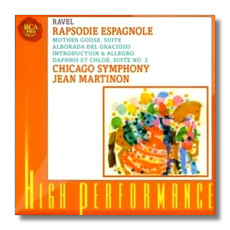
Maurice Ravel
- Rapsodie Espagñole
- Alborado del gracioso
- Ma mère l'oye: Suite
- Introduction and Allegro
- Daphnis et Chloé: Suite #2
Chicago Symphony Orchestra/Jean Martinon
RCA Red Seal High Performance 09026-63683-2 ADD 64:35

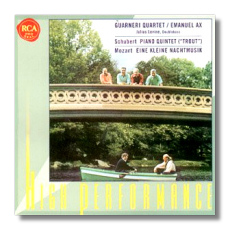
- Franz Schubert: Quintet in A Major, D.667 "Trout"
- Wolfgang Mozart: Eine kleine Nachtmusik
Emanuel Ax, piano
Julius Levine, double bass
Guarneri Quartet
RCA Red Seal High Performance 09026-63589-2 DDD 58:12

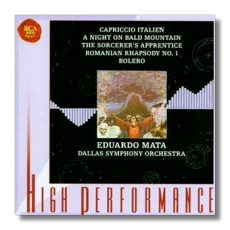
- Piotr Ilyitch Tchaikovsky: Capriccio italien
- Modest Mussorgsky: A Night on Bald Mountain
- Paul Dukas: The Sorcerer's Apprentice
- George Enescu: Romanian Rhapsody #1
- Maurice Ravel: Boléro
Dallas Symphony Orchestra/Eduardo Mata
RCA Red Seal High Performance 09026-63586-2 DDD 66:33

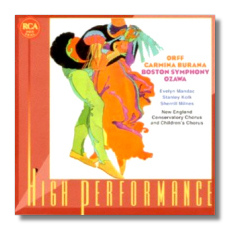
Carl Orff
- Carmina Burana
Evelyn Mandac, soprano
Stanley Kolk, tenor
Sherrill Milnes, baritone
New England Conservatory Chorus
Children's Chorus of the New England Conservatory
Boston Symphony Orchestra/Seiji Ozawa
RCA Red Seal High Performance 09026-63590-2 ADD 67:58
BMG Classics might be no more, but BMG Entertainment continues to release classical music. This is the latest batch of releases in the High Performance series, an audiophile collection that preserves some of the label's best recordings from the era between the end of Living Stereo and the maturity of the digital era. 24-bit resolution and 96-kHz remastering help to make these discs some of the warmest, richest, and most detailed recordings on the market, and their dynamic range is unusually wide.
Combining Schoenberg and Beethoven seems like a daft idea, yet Leinsdorf pulled it off in 1969 as part of his last concerts as Music Director of the Boston Symphony Orchestra. RCA recorded the results a few days later. Schoenberg's 6-minute music drama deals with the slaughter and ultimate spiritual triumph of Jews about to be transported to a Nazi death-camp. The work's climax is a setting for unison men's voices of the prayer Shema Yisroel. From this it is a hopeful step to Schiller's and Beethoven's "Alle Menschen werden Brüder," but isn't it beautiful to think so? Milnes speaks the Schoenberg's text grippingly, and Leinsdorf was seldom this dramatic. The entry of the men's chorus is hair-raising. The "Choral" Symphony also has a gripping sense of occasion to it. Leinsdorf shows unwonted impetuosity in his approach to tempos, and the Boston Symphony Orchestra, while not consistently as refined as it could be, plays the music tautly. There is drama and animal excitement in this reading, tempered by Leinsdorf's central European savvy. The chorus is lusty, and the soloists strong; Domingo, still in the early days of his stardom, is memorable in his "Turkish" solo. The engineering was fine then and it is gloriously alive now. (All of Leinsdorf's Boston Beethoven cycle is available in Europe on the super-budget "Explorer" label, and American collectors might want to place an order abroad to explore it, because it is very good)
Jean Martinon's Ravel disc is a treasurable souvenir of his relatively brief tenure with the Chicago Symphony Orchestra. The Daphnis suite was taped in 1964, shortly after the Reiner years came to an end, and the other four works were taped in 1968, right at the end of Martinon's time with the orchestra. He would go on to make new recordings of these works with the Orchestre de Paris, but the virtuosity of the Chicagoans and the recording engineers put this disc in a special class. The Rapsodie Espagñole is magically sensuous, especially in the opening "Prélude à la nuit." Throughout, Martinon precisely measures and mixes Ravel's ingredients, and the result is a heat-producing chemical reaction which belies the conductor's control. There's nothing cold or calculating about this musicianship – just red-blooded excitement. Martinon presents Alborada del gracioso as a cool impressionist sketch to contrast with the Rapsodie's expressionism. In Ma mère l'oye, Martinon turns story-teller, and is tender, gentle, and ever so lightly sentimental. Only in the final "Le jardin féerique" does one look for a little more spectacle. The Orchestra's principal harpist (Edward Druzinsky), flutist (Donald Peck), and clarinetist (Clark Brody) excel in the Introduction and Allegro, a piece as gorgeous as it is underplayed. Finally, in the Daphnis suite, Martinon's long-lined sensuousness makes one regret only that he didn't record the entire ballet for RCA in Chicago. These were good sounding LPs, and these digital remasterings uncover even more warmth and detail.
Schubert's "Trout" Quintet is practically indestructible, whether it's played for charm or for drive. The Guarneri Quartet (actually, just violinist John Dalley, violist Michael Tree, and cellist David Soyer here), joined by Emanuel Ax and Julius Levine, usually take an uncontroversial, middle of the road approach. The tendency, however, is more towards to New World than to the Old, and so the odd-numbered movements purr along efficiently with plenty of vigor and display. The slow movement and the variations themselves are more relaxed, if not particularly distinctive. Dalley's pinched tone in the upper registers may be wearing for some listeners. This recording was made in 1983. Mozart's equally popular Eine kleine Nachtmusik is done here as a string quintet, with violinist Arnold Steinhardt rejoining the other three members of the Guarneri Quartet, plus Julius Levine. Scholars believe that this is how Mozart intended the music to be played in the first place; the string orchestra version that usually is heard might not be authentic. The work loses nothing when it is played by only five musicians, and, unsurprisingly, it is that much more intimate. Again, the Guarneris plus Levine are efficient and reliable, but not gifted with an excess of Central European "glow." This was recorded in 1980. The early digital sound is good, but with passing moments of roughness.
Mata's program of popular showpieces is strong throughout, and I have no reservations about the quality of the recording – balanced and brilliant, this is the best sounding disc of the current batch. (These digital recordings were made in 1980 and 1981.) No one should doubt that the Dallas Symphony Orchestra can rank among the best American orchestras after hearing this disc. The Capriccio italien boasts burnished timbres from the brass. In the first part of the work, wind solos are played liltingly and with a charming lightness, and later on, excitement is achieved without force; this is not a driven reading. Similarly, Mata finds a persuasive delicacy in Mussorgsky's A Night on Bald Mountain and Dukas's The Sorcerer's Apprentice. The latter work is done drily, with humor of the most deadpan variety; one never believes that this apprentice truly was in danger. Mata gives Enescu's Romanian Rhapsody #1 a touch of elegance to go along with the picture-postcard colors, and the adrenaline that flows as the music pushes forward is judiciously applied. Finally, the Boléro is played at a reasonably measured tempo (14:51) that gives plenty of time for the nuances to register; every solo appearance is an occasion for the musician to establish his or her personality. Mata builds the music to an inexorable and irresistible climax while never relinquishing control. All in all, this is a collection of showpieces that succeeds much better than Ormandy's, an earlier entrant in the High Performance series (09026-63313-2). (Ormandy's disc duplicates the works by Mussorgsky and Dukas.)
At its initial release, Ozawa's Philips recording of Carmina Burana eclipsed this Boston version from 1970; now it is time to reassess Ozawa's earlier thoughts. Admirably, he downplays Orff the vulgarian and shapes this most popular of 20th-century choral works into something more than just a series of orgiastic bangs and crashes. When Orff asks for slow tempos, Ozawa is slow indeed, creating an almost hypnotic state in parts of "Uf dem Anger." Elsewhere, he is fast, but not ridiculously so, and unlike some other conductors, when Ozawa sets a tempo, he holds it, unless Orff requires him to do otherwise. Mandac's solos are not very interesting, yet she sings prettily enough. Kolk makes a good effect in the "roasted swan" song, and Milnes is sexily (but subtly) charismatic in his solos. The choruses are a mixed bag. The New England Conservatory Chorus has rough moments, and the tenors are weak. Still, the group has spirit, and it is funny to hear some of the choristers dramatically rolling their r's while others sing the Latin text with an obvious American accent. The children's chorus is tentative. The remastering gives this recording impressive clarity but less impressive weight. Texts and translations are included.
Also released in this batch of High Performance discs, but not received for review, is a live recording of Vladimir Horowitz playing Rachmaninoff's Third Piano Concerto at Carnegie Hall on January 8, 1978 (09026-63681-2). As I remember this performance, Horowitz is very exciting, but he approximates many of the concerto's most virtuosic passages, so this disc doesn't show him at his best. Still, it's hard not to scream along with the audience once it is all over. (Eugene Ormandy conducts the New York Philharmonic). The coupling is Rachmaninoff's Second Piano Sonata.
Copyright © 2000, Raymond Tuttle




















